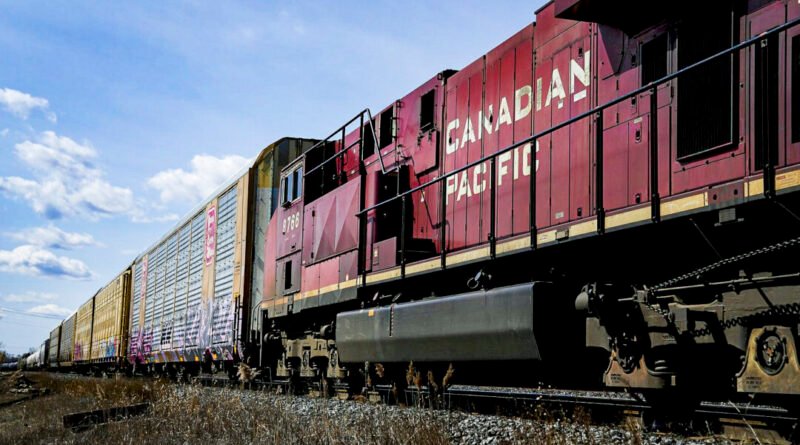Exploring the Key Policy Choices as Canada’s $380B Rail Sector Faces the Threat of a Strike
The possibility of a complete shutdown of all rail services in Canada due to a labour dispute could have severe consequences for commerce, sparking debates on how to prevent such disruptions. Some argue for policies to avoid such situations, while others emphasize the importance of maintaining labour negotiation power.
As the labour dispute continues between the Teamsters Canada Rail Conference and the Canadian National Railway and Canadian Pacific Kansas City, both companies have announced plans to lock out workers on Aug. 22 if an agreement is not reached. The Teamsters are also prepared to initiate a strike on the same date.
The dispute was temporarily halted in May when former Labour Minister Seamus O’Regan requested the Canadian Industrial Relations Board (CIRB) to determine the essential nature of rail services to health and safety. On Aug. 9, the CIRB concluded that no commodity was critical enough to override the right to collective bargaining.
John Corey, the president of the Freight Management Association of Canada, criticized this decision, stating, “I believe shutting down Canada is a significant issue, and perhaps these rail workers should be subject to binding arbitration.”
He also highlighted the impact of potential rail service disruptions, comparing it to the challenges faced during the COVID-19 pandemic when Transport Canada mandated continuous operation of both trucking and rail for goods flow within the supply chain.
Greg Gormick, a rail consultant from Toronto, supported the CIRB’s ruling, stating, “I believe it’s the right decision. I don’t promote strike action, but eliminating the right to strike diminishes bargaining power.”
Steven MacKinnon, the new Labour Minister succeeding O’Regan, urged both parties to reach an agreement independently, emphasizing that a negotiated deal is the preferred way forward.
“The parties involved in this dispute have a duty to the Canadian people,” MacKinnon said in a statement on Aug. 9. “A mutually agreed-upon resolution is the most effective path.”
‘Negative Impact on Reputation’
Canadian railways annually transport goods worth approximately $380 billion, with over $200 billion in exports. Corey highlighted the limited capacity of the trucking sector to substitute for halted rail services, expressing frustration among member organizations.
Corey mentioned that a single day of a railway strike takes a week for supply chains to recover and prolonged disputes will be noticeable to Canadians through reduced product availability.
He expressed concerns about the impact on consumers and the potential need for legislation to compel workers back to work in the event of an extended strike.
“It’s a last-resort measure and a sign of complete failure, indicating a lack of a mechanism to address such issues,” he added.
The United States encountered a similar situation in 2022 involving demands for paid sick leave and improved working conditions. The White House intervened by establishing a presidential emergency board to oversee negotiations, ultimately securing a tentative agreement.
‘High Worker Turnover’
The union identified crew scheduling, rail safety, and fatigue management as key concerns, with railways seeking concessions.
CN reported making several offers related to wages, rest, and labour availability, all of which were rejected. CPKC also adjusted its proposal to focus on wage increases instead of other scheduling concerns.
A CN webpage providing updates on bargaining revealed the average workdays for employees and highlighted the compensation received by railway conductors and engineers.
Gormick noted the demanding nature of railway jobs and the high turnover rate among workers, particularly at CPKC.
He emphasized the need for a comprehensive national transportation policy in Canada to address long-standing industry challenges effectively.
He also pointed out Canada’s fragmented governance structure as a contributing factor to transportation policy distortions, with provinces overseeing highways and the federal government responsible for railways.
‘Essential Railway Infrastructure’
Gormick referenced a recent incident involving a collapsed CN lift bridge in Fort Frances, Ont., underscoring Canada’s inadequate rail infrastructure. He noted the lack of redundancy and resilience in the transportation system, emphasizing the need for a comprehensive national transportation plan.
He stressed the importance of a viable transportation system for Canada’s national identity, stating, “Without railways, there is no Canada.”






